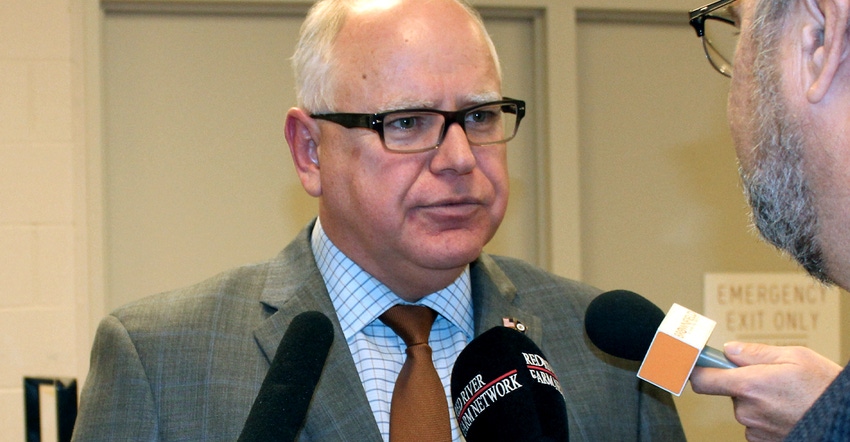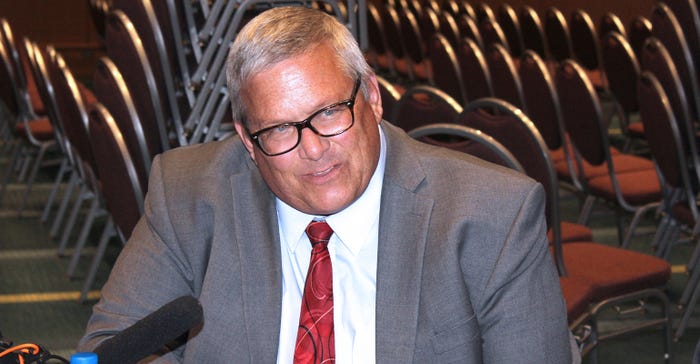
Gov. Tim Walz brought his campaign theme of One Minnesota to the AgriGrowth stage when he delivered his first State of the State of Agriculture address before the state's agricultural leaders.
"I don't think you can talk about the state of the state of agriculture separate from the state of the state of manufacturing in Minnesota, separate from the state of the state where people are at," he said. "There are unique challenges and unique issues, but here's what we need: To truly keep Minnesota agriculture strong, profitable, forward-leading and innovating, we need all Minnesotans to be brought into it. We need all Minnesotans to see they have a stake in it."
Walz was among the policymakers speaking at the Ag and Food Summit on Nov. 7 hosted by the Minnesota AgriGrowth Council in Minneapolis. Roughly 330 agricultural leaders gathered for the event.
Greater Minnesota and the metropolitan area need one another today as much as they did in the 1800s when farmers brought their wheat to Minneapolis to be milled into flour and shipped to markets on the Mississippi River, Walz told the crowd.
Minnesotans have done great things, he added, from mining the iron ore that helped the country win the great war to feeding millions through the Green Revolution sparked by University of Minnesota-educated Norman Borlaug to saving thousands through the innovation of the medical device industry, but it's time for the state to do more. Instead of trying to find blame, it's time to Minnesota to lead once again, he said.
"I'm asking Minnesota, let's step up and show them how it can be done, let's step up and figure out a solution, let's come together and get rid of the small fights. Let's have the real, meaningful discussion about policy and then let's find a compromise," Walz said.
Bill Northey, USDA undersecretary of food production, also spoke the AgriGrowth summit.
 Bill Northey, USDA undersecretary for farm production, talked about what a disaster declaration means while at the Ag and Food Summit hosted by the Minnesota AgriGrowth Council on Nov. 7 at the Minneapolis Convention Center. "There are benefits to it," he said, "but it's not a savior."
Bill Northey, USDA undersecretary for farm production, talked about what a disaster declaration means while at the Ag and Food Summit hosted by the Minnesota AgriGrowth Council on Nov. 7 at the Minneapolis Convention Center. "There are benefits to it," he said, "but it's not a savior."

Northey said he hopes there's an agreement between China and the U.S. soon, but it will probably take a while after a trade deal is reached for China to resume purchases of U.S. commodities. While the second round of the 2019 Market Facilitation Program payments have been authorized, the third round will be decided in January or February 2020.
The first round of payments, issued in September, contained 50% of the up to $14.5 billion targeted for Market Facilitation Program payments. The payments announced this month make up 25%, with 25% left to be determined in the new year.
Walz, speaking to reporters after his speech, said he's concerned buyers won't come back. Agriculture, he said, felt the pain of the trade war first and he fears will be the last to see benefits.
Like the Walz administration, the Trump administration is working to expand markets with USDA officials making recent trade trips to West Africa, Vietnam and Mexico.
Walz said he has a good working relationship with administration officials. He's been in contact with USDA regarding disaster assistance for northwest Minnesota as well as the issue of small refinery waivers. The waivers, granted by U.S. EPA, have exempted refiners from using biofuels as required by the Renewable Fuel Standard. Walz and South Dakota Gov. Kristi Noem lead the national Governors' Biofuels Coalition and have advocated for the administration to support biofuels.
The state will also be working with USDA on its hemp production program. Minnesota has had a hemp program since 2015 and USDA recently released federal rules for hemp production. The state program needs to at least meet the federal standards. Walz said he wants Minnesota's program to be drama-free. Listening sessions are scheduled in Detroit Lakes (Nov. 18), St. Paul (Nov. 20) and Mankato (Nov. 21), according to Minnesota agriculture commissioner Thom Petersen.
“We are actively reviewing the rules USDA recently released,” Petersen said. “We want to ensure our state plan and upcoming rules work for those in the industry, and we welcome input during this process. It’s important to lay a good foundation to ensure this new industry is successful into the future.”
Northey added: "There's a huge interest in hemp across our country."
Kubat Willette is a Farm Progress digital content creator.
About the Author(s)
You May Also Like




